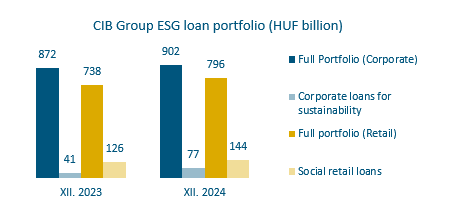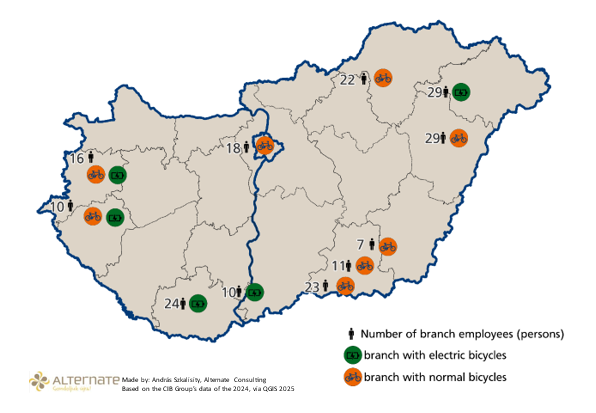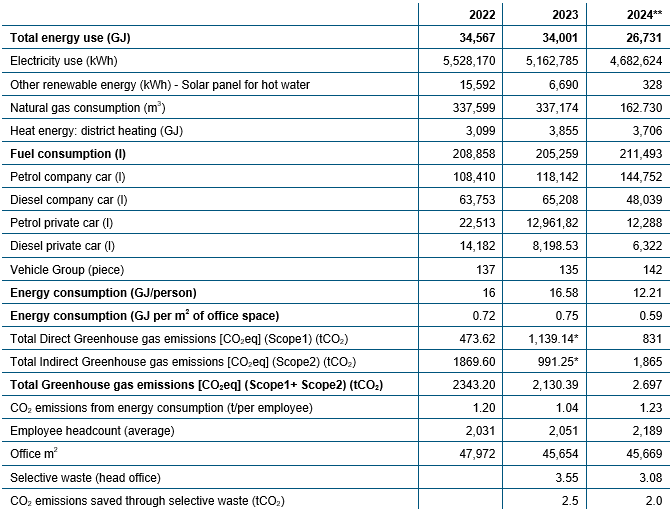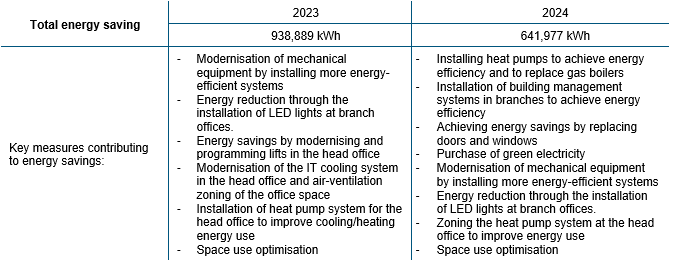Environment and Climate Change
Transition to a sustainable, green and circular economy
Loans and services for the Green and Circular Economy
Mass segment
On 1 February 2023, CIB Bank introduced the dedicated Green Interest Discount, which provides a low-interest loan for the purchase and construction of low-energy consumption real property, provided that the property has at least ‘BB’ energy rating and its primary energy consumption does not exceed the following values:
- For a real property with a construction permit issued before 1 November 2023: the property has at least ‘BB’ energy rating and its primary energy consumption does not exceed the value of 80kWh/m2/year,
- For a real property with a construction permit issued on or after 1 November 2023: the property has at least ‘BB’ energy rating and its primary energy consumption does not exceed the value of 76kWh/m2/year,
- This gives customers access to the bank's most favourable interest rate without any income-related conditions.
- In 2024, CIB Bank focused on the sale of existing green loan products and did not launch any new products in addition to the existing ones.
Small Business
The Russian-Ukrainian war following the outbreak of the coronavirus as well as the energy crisis across Europe have left many businesses in a difficult situation, so state-subsidised schemes available under the Széchenyi Card Programme MAX in 2022, then the Széchenyi Card Programme MAX+ in 2023 were introduced to support these businesses in restarting and accessing funds; these products were among the most sought-after loan products available to small entrepreneurs in 2024 and 2025.
Not only SMEs and large companies, but also small businesses (and even sole traders) may use the CIB Business Online platform, which is an electronic channel with a wide range of functionalities – e.g. multiple transfers, direct debit orders, extensive range of forms and self-administration functions – thereby replacing many previously paper-based processes.
In addition, for recently established small businesses and other customers with a low number of transactions, the bank offers the Partner Start Account Package, which provides them with a cost-effective means of conducting their banking. As part of this package, CIB Bank waives the following fees during an initial discount period:
- CIB Bank Mobile Application and CIB Internet Bank / CIB Bank Online registration fee (which is usually payable at the time the bank account agreement is concluded)
- CIB Bank Mobile Application monthly fee
- Bank card fee in the first year (Visa Compact business card)
The discounts apply to transactions on the electronic and CIB Business Online channels (HUF and FCY payments, HUF payments via GIRO to the tax authority (NAV) account (on all the electronic channels)).
The above discounted rates are valid for account turnovers of at least HUF 40,000/month. The account package can be offered to both individual and corporate businesses, but the main target group is newly established businesses.
Corporate segment
In the corporate segments, the bank encourages its customers to invest in green and circular investments and developments through preferential pricing. This includes developments related to renewable energy, investments targeting energy efficiency as well as efficiency technology upgrades.
Currently available corporate products supporting sustainability:
- Széchenyi Restart Investment Loan MAX+ loan facility for energy efficiency improvements and technology shift
- Agricultural Széchenyi Restart Investment Loan MAX+ loan facility for energy efficiency improvements and technology shift
- Széchenyi Restart Investment Loan MAX+ supporting green transition and sustainable development, a so-called ‘GREEN’ sub-loan facility
- Agricultural Széchenyi Restart Investment Loan MAX+ supporting green transition and sustainable development, a so-called ‘GREEN’ sub-loan facility
- EXIM JEA Green loan purpose
- S-Loan product family
- Circular Exonomy and Green Plafond investment loans
Environmental sustainability has an increasingly important role in the financing of the corporate business line, and, simultaneously with this, restrictions are implemented in the coal, unconventional oil, and gas extraction sector. The bank's loan portfolio has seen an increasing share of loans provided for renewable energy production (photovoltaic solar power plants and biogas plants), loans supporting transition and energy investment loans.

The bank is steadily increasing its financed portfolio, with the total corporate portfolio exceeding HUF 900 billion in 2024, and the total retail portfolio standing at nearly HUF 800 billion. The share of corporate sustainable loans amounts HUF 77 billion, and the share of retail social loans exceeded HUF 140 billion.
The production of renewable energy and the transition to a circular economy are promoted by the bank’s owner, Intesa Sanpaolo S.p.A., through its subsidiary banks, within the scope of Circular Economy and Green Plafond, in which CIB Bank also participates. In addition, EXIMBANK’s Green refinancing programme is also available at CIB Bank.
Sales have started for the S-Loan and the dedicated S-Loan product range, which provides funding for sustainability purposes at a discounted rate for SMEs, medium-sized and large enterprises.
Sustainability financing is increasingly becoming a mainstream part of operations. It is important to ensure that transactions are identifiable from a sustainability perspective, as well as to identify the statutes and guidelines under which the bank categorises transactions into compliance classes. A complete solution – compliant with Regulation (EU) 2020/852 – has been developed and is currently being implemented. A financing solution to support renewable energy production and the transition to circular economy, as well as other social, corporate governance and environmental financing solutions, is already available in the bank. The bank rewards transactions in this category with a pricing discount. In addition, the bank continues to look for opportunities to provide financing from the green credit line provided by a refinancer, such as the EXIMBANK Green Refinancing Programme available at CIB Bank. As the framework conditions for the financing solutions available under the above schemes are different, the bank can cater for various customer needs.
Full compliance with the Taxonomy is the highest of the multi-level sustainability objectives. This legislation (Regulation (EU) 2020/852) imposes the most conditions on the financed investments. For the time being, the number of transactions that fully meet the legal requirements is not significant.
As a member of the Intesa Sanpaolo Group, CIB Bank is committed to sustainable and responsible investments. Eurizon Capital SGR S.p.A., the Intesa Sanpaolo Group member responsible for asset management, was the first to set up an ethical investment fund in Italy in 1996, and in 2017 it integrated ESG guidelines into its investment-related decision-making processes. In 2021, Eurizon adopted a sustainability policy in line with the SFDR (EU Sustainable Finance Disclosure Regulation) and ensured that more than 54% of its products are in compliance with Articles 8 and 9 of the SFDR.
Intesa Sanpaolo S.p.A. and Eurizon Asset Management Hungary Zrt., a member of the Eurizon Group, have made the implementation of ESG (Environmental, Social and Governance) and SRI (Socially Responsible Investment) aspects a priority in the development of new products – in compliance with the relevant EU regulations and the expectations of the Eurizon Capital Group – and therefore, taking these aspects into account, CIB Bank also offers its customers investment funds issued in HUF and EUR falling within the scope of Article 8 of the SFDR that promote environmental and social characteristics:
- Subfund of the Eurizon ESG Talentum Total Return Funds
- Subfund of the Eurizon Euro ESG Talentum Total Return Funds
Green culture and initiatives
Riding a bike to work
Riding a bike to work continues to be popular, and our bicycle storage facilities were used to full capacity last year.

Earth Hour
Among the environmental initiatives the CIB Group first joined Earth Hour, the WWF’s international climate protection initiative, 14 years ago, in 2010. This continued in 2024, with the non-essential external lighting in the head office switched off not just for an hour, but for the whole weekend, to underline the importance of climate change and the environment. Similarly to the previous year, we saved a total of 14.7 kWh in energy.
Reducing harmful emissions, increasing energy efficiency
The bank placed KTM electric bicycles in five rural branches to further reduce harmful emissions from its own operations and to strengthen its commitment and ambition among its customers, partners and employees through using these e-bikes. Employees at eight rural branches continue to actively use the traditional bikes placed there.
The bank has amended its company car policy to allow only hybrid or plug-in hybrid company cars to be ordered. Accordingly, in 2024, it replaced more than 30% of the fleet by energy-efficient (low-consumption) hybrid and plug-in hybrid vehicles, which replace standard petrol and diesel cars, further reducing the annual fuel consumption per car.
For business purposes, electric or hybrid taxis can still be ordered in Budapest.
In 2024, bank employees travelled a total of 7,245 km in the capital using vehicles through electric car-sharing.
AWorld initiative
On the initiative of its Parent Bank, Intesa Sanpaolo S.p.A., CIB Bank has launched a campaign from April to 5 June 2024 to encourage its colleagues to download and use the AWorld app. AWorld is the official platform of ACTNOW, the UN’s campaign for individual action on climate change and sustainability. The platform is a playful way to help users develop long-term sustainable habits and to help track and reduce carbon emissions by offering personalised solutions. The application has been downloaded and used by 210 colleagues. In addition to engaging colleagues, CIB Bank supported the Forest Savers Foundation, donating HUF 1,000,000.
GoGreener initiative
The bank joined the GoGreener initiative launched by Mastercard, encouraging its employees to collect sustainable mileage collected between home and work, from 2 to 30 September. The aim was to achieve that they choose lower-emission means of transport to work, such as public transport, scooters, walking, boat services or car-sharing. Colleagues registered their eco-friendly kilometres on an online platform, which showed that they travelled a total of 29,160 kilometres using environmentally friendly means of transport.
World Soil Day
The aim of the World Soil Day, initiated by the Food and Agriculture Organization (FAO) of the United Nations, was to raise awareness of soil erosion, soil pollution and desertification, and to how sustainable management and informed decisions can help to protect this essential resource. On the initiative of the Parent Bank, the bank raised awareness of the importance of healthy soil on its website and social media platforms.
Direct environmental impact
Greenhouse gas emissions and energy consumption
The management of CIB Bank Zrt. declares its commitment to reducing unnecessary energy consumption, increasing energy efficiency and, as part of its social responsibility, to high-level, impeccable compliance with the requirements of the relevant EU directives, as well as to maintaining and continuously developing a modern, integrated energy management system. The primary goal is to maintain the bank’s customer trust by operating an effective energy management system, to preserve the good reputation of CIB Bank Zrt. and to secure and improve its market position. To this end: the bank intends to comply with all relevant legal requirements and other obligations related to energy management, continuously improves its energy performance indicators and energy management system; ensures the availability of information and resources to achieve its set energy management goals; incorporates energy efficiency as a key element in its procurement, renovation and new construction plans; By increasing the responsibility of its employees for energy efficiency, it strives to prevent environmental pollution, reduce environmental impact and energy consumption; it encourages its employees to contribute constructively to the achievement of corporate goals and the development of the effectiveness of processes. The energy policy is an equal and coordinated part of the general policy and strategy of CIB Bank Zrt.
 Based on data as of 31 December 2024
Based on data as of 31 December 2024
ISO 50001 at the CIB Bank
Recognising that energy management has become a key factor both in business and from a social point of view, CIB Bank introduced the ISO 50001 energy management system standard at the company in 2016, which helps embed energy management into its corporate culture. Besides being a legal requirement, the introduction of this standard is also a means of improving the company’s energy efficiency through regulated and monitored energy management and is therefore justified by both management expectations and professional reasons. In January 2023, CIB Bank successfully renewed its certification for another three years in compliance with the ISO 50001:2018 standard. Its goal is to reduce energy costs, greenhouse gas emissions and other forms of harmful environmental impact.
The standard aims to integrate energy management activities into a single system and is based on the ‘plan, do, check, act’ (PDCA) process cycle.

Based on data as of 31 December 2024
* The share of Scope1 and Scope2 emissions has changed due to a shift in consumption. The company is continuously replacing its gas-based heating systems, switching to heat pump and air conditioning solutions, which has resulted in a significant transfer of carbon consumption from Scope 1 to Scope 2.
** Methodology changed in 2024 due to CSRD application

Based on data as of 31 December 2024
The CIB Group is committed to introducing the ISO 14001 Environmental Management System in 2026, and to developing its Scope 3 calculation methodology.
The solar collectors installed on the roof of the head office in Petrezselyem Street, as well as on the CIB24 buildings, provide part of the hot water to the two central office buildings. The solar collectors have been under repair in 2024, and therefore the energy generated by them has been minimal; the longer-term fall in output being due to system failures in recent years.

Based on data as of 31 March 2025. Supplemented by the volume of green electricity starting in 2024.
The bank’s successful environmental programs related to energy consumption and climate change:
- In one bank branch, the interior lighting was upgraded, and any faulty old fittings were replaced with LED lighting;
- There were minor mechanical engineering investments at branches to improve subsystems (fan coils, radiators, thermostats);
- Reduction of energy consumption by air-supply zoning of the heat pump in the head office space;
- A heat pump cooling/heating system was installed in the branches to improve energy use efficiency;
- Installation of new air treatment equipment in the Székesfehérvár branch;
- The company car policy was reviewed at the end of 2024 with a view to the possible introduction of zero-emission cars.
- The CIB Group
- created 6 parking spaces equipped with electric charging points in the underground parking garage of its central building for the charging of electric (to be procured later) and plug-in hybrid company cars (already in the fleet);
- amended its company car policy to allow only hybrid or plug-in hybrid company cars to be procured. Accordingly, in the same year, it replaced more than 30% of the fleet by energy-efficient (low-consumption) hybrid and plug-in hybrid vehicles, procured to replace standard petrol and diesel cars, thus CIB Group further reduced the annual fuel consumption per car;
- the GreenGo electric car-sharing service remains available to employees, with a total mileage of 7,245 km by CIB Group’s employees with shared electric cars this year, instead of using taxis or company pool cars;
- as before, only hybrid or electric taxis can be ordered for business use; employees complied with this rule in 95% of cases this year.
Responsible management of resources

Based on data as of 31 December 2024
*Water consumption has increased due to the return from hybrid work schedules after the pandemic, and due to gardening activities.
Successful environmental programs related to responsible resource management:
- An information system has been introduced to provide branch managers with monthly information on the electricity, gas, and water consumption of the branch they manage. In addition, regional energy forums will be organised to analyse consumption data from branches with branch managers and share good practices.
- Paper usage per employee - office A4, A3 – 46.11 kg/person (2023: 29 kg/person)
- Paperless projects: Starting from 2018, CIB Bank has launched some specific actions to promote dematerialisation and reduce paper consumption related to commercial and/or transactional activities.
- In 2024, the bank used 128,058 kg of paper, a change of 117% compared to 2023. Despite the increase, the proportion of uncertified paper in total paper consumption decreased from 36% to 18%.
- The bank saved 6,713 kg of paper in bulk mailing (2023: 11,520 kg). Paper used for bulk mailing continued to decrease, accounting for 80% of the paper used in 2023, however, due to increased business activity in the office, paper used in office for business activities increased by 38% compared to the amount used in 2023. Within this category, there was a particular increase in printing paper consumption, by 51%. Paper used for marketing activities decreased by 12%, while the use of hygienic paper increased by 27%.
Paper consumption

Based on data as of 31 December 2024
Related documents
